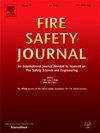Post-fire residual mechanical properties of Q460GJ steel under different pre-tensile stresses
IF 3.4
3区 工程技术
Q2 ENGINEERING, CIVIL
引用次数: 0
Abstract
Previous studies on the post-fire mechanical properties of steel were conducted with unstressed state, without considering the influence of pre-stress which subjected to structures in reality. In this article, the post-fire residual mechanical properties of Q460GJ steel under different pre-tensile stresses were studied. The stress-strain curve, elastic modulus, yield strength, ultimate strength and fracture elongation of Q460GJ steel after different elevated temperatures heating are analyzed in detail. The experimental results are compared with that of Q460 steel and S460 steel in the existing literatures. At last, the predictive equations of post-fire mechanical properties of Q460GJ steel under different pre-tensile stresses are established. Q460GJ steel still maintains good ductility after elevated temperature heating, which increases the possibility of reuse of Q460GJ steel element after fire. The Q460GJ steel has better post-fire ductility than that of Q460 and S460 steels. The predictive equations for the post-fire residual mechanical properties for Q460GJ steel under different pre-tensile stresses were proposed. The variation coefficients of yield strength for Q460GJ steel under different pre-tensile stresses after 20 min different elevated temperatures heating were within 0.065. The findings should have a great significance to providing theoretical support for design of reusing or restoring steel building after fire.
不同预拉伸应力下 Q460GJ 钢的火烧后残余力学性能
以往关于钢材火烧后力学性能的研究都是在无应力状态下进行的,没有考虑实际结构所受预应力的影响。本文研究了 Q460GJ 钢在不同预拉伸应力下的火烧后残余力学性能。详细分析了 Q460GJ 钢在不同升温加热后的应力-应变曲线、弹性模量、屈服强度、极限强度和断裂伸长率。实验结果与现有文献中 Q460 钢和 S460 钢的实验结果进行了比较。最后,建立了 Q460GJ 钢在不同预拉伸应力下的火后力学性能预测方程。Q460GJ 钢在高温加热后仍能保持良好的延展性,这增加了 Q460GJ 钢构件在火灾后重新使用的可能性。与 Q460 和 S460 钢相比,Q460GJ 钢具有更好的火后延展性。提出了 Q460GJ 钢在不同预拉伸应力下的火后残余力学性能预测方程。Q460GJ 钢在不同预拉应力下,经过 20 分钟不同的高温加热后,屈服强度的变化系数在 0.065 以内。该研究结果对火灾后钢结构建筑的再利用或修复设计提供了理论支持,具有重要意义。
本文章由计算机程序翻译,如有差异,请以英文原文为准。
求助全文
约1分钟内获得全文
求助全文
来源期刊

Fire Safety Journal
工程技术-材料科学:综合
CiteScore
5.70
自引率
9.70%
发文量
153
审稿时长
60 days
期刊介绍:
Fire Safety Journal is the leading publication dealing with all aspects of fire safety engineering. Its scope is purposefully wide, as it is deemed important to encourage papers from all sources within this multidisciplinary subject, thus providing a forum for its further development as a distinct engineering discipline. This is an essential step towards gaining a status equal to that enjoyed by the other engineering disciplines.
 求助内容:
求助内容: 应助结果提醒方式:
应助结果提醒方式:


